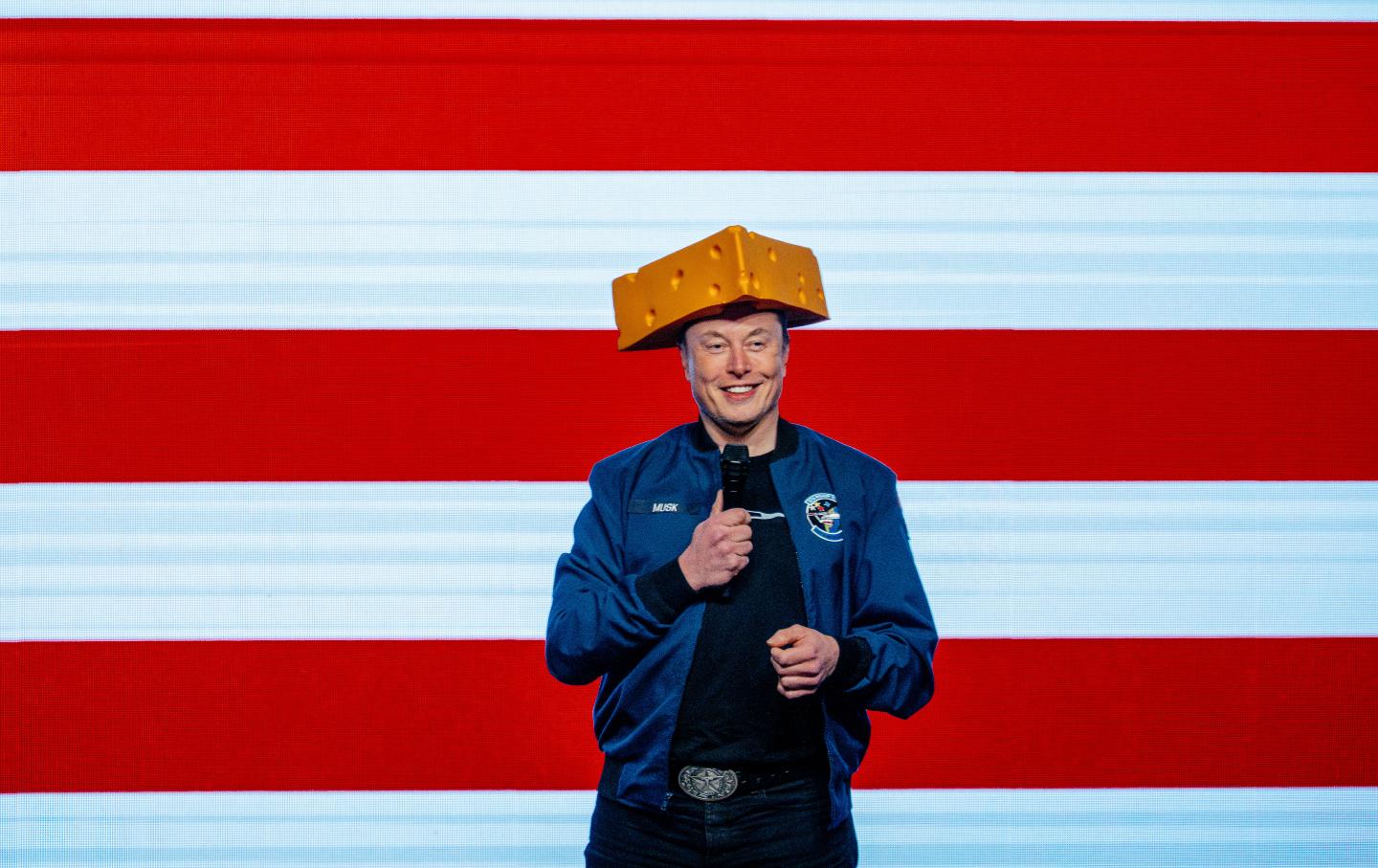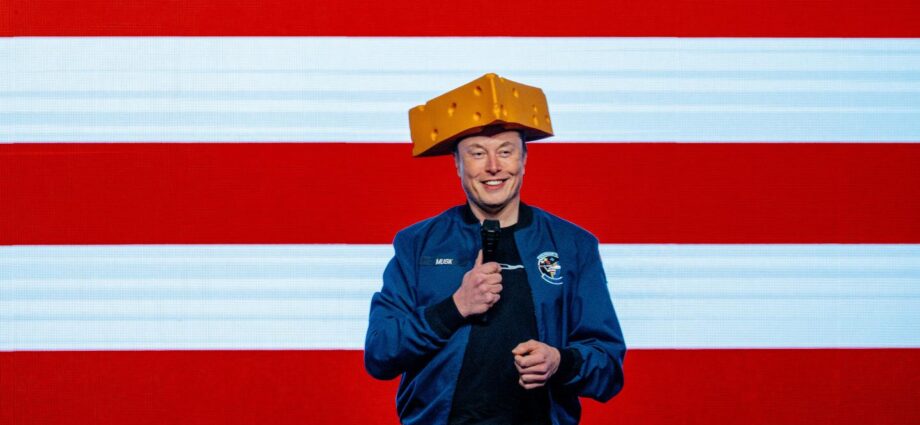July 8, 2025
The tech mogul’s latest intervention in US politics serves as a perfect proof of concept for the futility and stupidity of billionaire-driven politics.

Elon Musk wears a cheesehead hat at his America PAC rally in Green Bay, Wisconsin, March 30, 2025. The Tesla CEO held the town hall to support the Republican candidate in the state’s upcoming Supreme Court election.
(Jamie Kelter Davis / Getty Images)
There’s nothing good to say about the mammoth spending bill that Donald Trump and his dutiful underlings rushed through Congress last week, but here’s one promising bit of collateral fallout: The regressive and authoritarian effort to further transform the United States into a plutocratic police state has sealed Elon Musk’s defection from the GOP. Over the weekend, Musk debuted plans to launch a third political party with an announcement on his social media site, X, after apparently polling users on their support for such a venture: “By a factor of 2 to 1, you want a new political party and you shall have it! When it comes to bankrupting our country with waste & graft, we live in a one-party system, not a democracy.”
By a factor of 2 to 1, you want a new political party and you shall have it!
When it comes to bankrupting our country with waste & graft, we live in a one-party system, not a democracy.
Today, the America Party is formed to give you back your freedom. https://t.co/9K8AD04QQN
— Elon Musk (@elonmusk) July 5, 2025
Of course, a third party conceived and captained by the world’s richest man is scarcely a model to reclaim our imperiled democracy—particularly given Musk’s own well-documented affinities for white nationalist agitprop. And like many Muskian undertakings, his newly christened “America Party” is little more than vaporware, without even a filing in motion with the Federal Election Commission. Yet in the broader dialectical sweep of things, Musk’s latest intervention in US politics should be welcomed—if only for serving as a high-octane proof of concept for the futility and stupidity of billionaire-driven politics.
You wouldn’t think such a demonstration would be necessary in the dismal antidemocratic excrescences of a second Trump term, but as they are fond of saying on X: “Here we are.” The grotesque tax cuts, life-destroying rollbacks of basic income and healthcare protections, and police-state border crackdowns instituted by the perversely named “One Big Beautiful Bill” should stand as devastating indictments of governance by the finance-and-rentier class. And yet the bogus branding of MAGA as a working-class insurgency rolls blindly on, stoked mostly by feckless symbolic flourishes such as a meaningless suspension of taxes on tips and the interest on car loans, and Trump-sanctioned lies about Social Security benefits going untaxed. (Even if the GOP’s feeble sops to hospitality workers and new-car buyers had significantly improved their spending power, those features of the bill sunset in a few years, while the bill’s trillions in tax cuts benefitting the wealthy are permanent.)
Musk’s dissension from the spending bill, of course, doesn’t touch on its status as the single greatest upward distribution of income effectuated in the history of American lawmaking—but you wouldn’t expect such criticisms from someone who’s amassed a galactic-scale fortune on government contracts. No, Musk takes the standard mogul’s line on government spending, demanding an austerity regime to counteract the drunken conduct of a Congress set on making America bankrupt via a measure that would “massively increase the already gigantic budget deficit,” as he again lamented on X.
There was never any chance that any individual as lavishly overcompensated as Musk would deliver a serious critique of the system that’s delivered his vast tranches of wealth. But in the desperate straits we now call American political life, a right-wing spending hawk determined to fracture the MAGA coalition at its big-money base is a useful blunt instrument. Just consider the example set by the last deficit-deranged mogul who ventured into national politics: independent presidential candidate H. Ross Perot.
Perot was in many ways a prophetic forerunner of Musk’s political escapades; like Musk, he amassed a gigantic fortune in digital-sector government contracts, and fancied himself a maverick truth-teller in a corrupt and cronyist political establishment. (Unlike Musk, he didn’t own a major media platform, and so had to rely on Larry King’s CNN talk show as his propaganda platform of choice.) Perot was also, like Musk, a singularly erratic character: He abruptly withdrew his popular independent candidacy when he became convinced that Bill Clinton was the change candidate in the 1992 election, only to reverse and belatedly scurry back into the race. (He also became convinced that the George H.W. Bush White House was targeting him for a dirty tricks campaign that involved a plot to disrupt his daughter’s wedding, suggesting that, like Musk, he had an overdeveloped sense of paranoia and the terminal self-importance to fuel it.) The only significant difference between the two men is that, so far as we know, Perot was not acting under the influence of ketamine.
Despite his erratic approach to campaigning, Perot netted 19 percent of the popular vote in the ’92 general election—the best showing of any third-party candidate since Theodore Roosevelt’s 1912 Bull Moose party run. Perot’s showing was more than enough to deny Bush’s reelection bid—and it’s not too much to hope that an America Party lurch into the 2026 midterms could likewise split Trump’s MAGA base as it faces off against a Democratic opposition that uses marathon congressional speeches as its favored messaging strategy. What’s more, Perot was proven right on a vital issue: the Democratic Party’s lapse into the pieties of free trade and globalized capitalism. (He famously announced that NAFTA, GATT, and the whole scheme of bottom-feeding international trade would create “a giant sucking sound” where American manufacturing jobs used to be.) In an alternate political universe where the newly business-minded Clintonite regime could productively absorb such criticism, the makings of Trump’s takeover of American politics three and a half decades later wouldn’t exist.
And that’s not all. Donald Trump came very close to signing on as the nominee for Perot’s Reform Party in the 2000 cycle; had Trump himself caught the mogul special-interest bug back then, he, like Perot, would have been relegated to footnote status in US political history. Instead he pulled out, and the Reform Party nominated Pat Buchanan, who wound up playing Barry Goldwater to Trump’s Ronald Reagan: the electoral sacrifice necessary to galvanize a full-blown right-wing revolution.
The Perot experiment shows how, despite the well-known shortcomings of third parties in electoral politics, the vanity campaigns of the ultrarich can do a great deal of mischief in the ever-frail bid to transform hard-right business ideology into a viable approach to mass politics. Nor is he the only example: The libertarian-minded Steve Forbes also ran twice for the presidency, campaigning chiefly on the flat tax, another deeply regressive fiscal gimmick that appeals almost exclusively to plutocrats. The charisma-challenged Forbes spent so much on his doomed Oval Office fantasies that WMUR, a New Hampshire ABC affiliate, is known to this day as “the house that Forbes built” for all the money he lavished on TV spots for his New Hampshire primary campaigns.
That episode underlines another reason we should greet Musk’s America Party experiment with open arms: Vanity political launches are probably the least harmful way for the wealthy to spend money on politics. With industries from crypto to Big Pharma spending vast sums of campaign and lobbying cash to game the legislative process to their advantage—and producing travesties like the One Big Beautiful Bill as a result—there’s every reason to take attention-challenged dolts like Musk by the hand and say, “Please sir, found your own political party.”
In Musk’s case, the attraction is exponentially greater, not just because of the unprecedented scale of his wealth, but also because he’s so incredibly bad at doing anything genuinely useful with it. His Boring Company, which is supposed to create high-speed tunnel transport in major cities, is largely a work of smoke and mirrors, as a devastating Wall Street Journal exposé showed. Musk’s role at Tesla, his best-known and most lucrative property, is chiefly that of a Trumpian brand-exhorter: the basic model for Tesla’s line of EV vehicles was already well in place when Musk mounted his takeover of the firm. (Meanwhile, Musk’s signature contribution to the Tesla line, the Cybertruck, is prone to spontaneous combustion and full-body collapse.) Oh, and Tesla’s stock price has tanked on a galactic scale because of—wait for it—Musk’s feckless political projects; indeed, it fell another 7.6 percent when Trump dismissed Musk’s third-party hobbyhorse as “ridiculous.” The story at Musk’s government-subsidized rocket concern, SpaceX, is mostly the same—only with far more dramatic explosions and potential consequences.
With Musk at its helm, the America Party can serve as the ne plus ultra example of why American politics should be permanently quarantined from billionaire influence—provided, of course, that it doesn’t burst into flames at its launch. One early sign of encouragement along these lines is that Musk has recently followed fellow Silicon Valley know-nothing and presidential also-ran Andrew Yang on X, presumably in response to Elon-ward overtures Yang mounted last month to launch a third party. Here’s some free advice to both bros: Get Steve Forbes on board, and you’ll be unstoppable.
Chris Lehmann
Chris Lehmann is the DC Bureau chief for The Nation and a contributing editor at The Baffler. He was formerly editor of The Baffler and The New Republic, and is the author, most recently, of The Money Cult: Capitalism, Christianity, and the Unmaking of the American Dream (Melville House, 2016).


